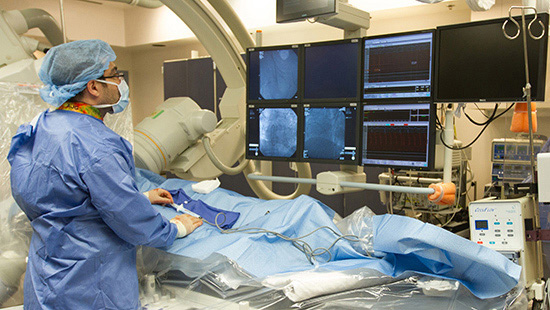Arrhythmia Treatments

A number of medical offices care for the more common types of arrhythmia and offer basic therapies like medications or pacemakers.
But we offer a comprehensive range of services for all arrhythmias — including those associated with complex congenital heart disease.
Diagnosing and Treating Arrhythmia
At the University of Maryland Heart and Vascular Center, our patients have access to the very latest cardiac diagnostic technology and doctors who have spent years refining the clinical judgment needed to make the right evaluation.
Our doctors will confirm or rule out the possibility of an arrhythmia and its suspected causes. We offer this service in two fully equipped electrophysiology (EP) exam suites — one of the few centers in the region to offer such a specialized, comprehensive facility.
Some arrhythmias only require regular checkups, while our team treats others with lifestyle changes or medications — either approved drugs or those in clinical trials. We offer a full range of therapies and services when further intervention is necessary:
- Atrial fibrillation stroke prevention
- Cardioversion
- Catheter ablation
- Thoracoscopic Maze
- CryoMaze ablation
- Implantable cardioverter defibrillators (ICDs) and pacemakers
- Pediatric care
Our program features:
- Established experience: Our arrhythmia doctors (electrophysiologists) have a long track record of treating complex arrhythmias, including atrial fibrillation, atrial tachycardia and ventricular tachycardia. Accurately diagnosing arrhythmia requires a developed sense of clinical judgment and practice.
- World-leading imaging: We are world-recognized for incorporating 3D imaging into treatment planning for complex arrhythmias like ventricular tachycardia (v-tach). Learn more about our 3D imaging and v-tach ablation.
- Pediatric Care: Our center is one of the few in the region with an electrophysiologist specializing in pediatric care.
- Dedicated labs: Treatment and services are provided in inpatient units, outpatient practices or one of our comprehensive electrophysiology (EP) labs — specialized facilities that only a few centers in the region offer.
